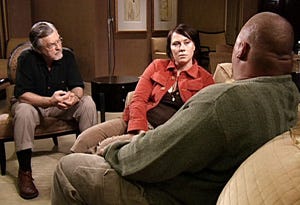Multimillionaire Marie Forleo credits this 4-step habit for saving her relationship
& the goss on my new-ish man ...
Multi-millionaire Marie Forleo credits this habit for saving her relationship. Song-bird Alanis Morissette is also a fan. And I just started creating this habit with my new-ish man.
Speaking of which, this is my first public outing of the ‘Pirate’. We met in November 2017. I fell in love with his mind before I met the rest of him. He’s gorgeous with a giant mind and heart. He's also the most courageous human I know. Oh, and he's a sensational chef. Yes, I know. Hashtag LotteryWinner.
[Note: I originally wrote this article in, I think, 2018. It is now 2024. The Pirate and I are still very much together - very much each others muses. I'll give a brief update at the end of this article, but - spoiler alert - only last night we used the conflict resolution technique I'm about to describe ... ]
More violence than love
Also, like so many men I know, the Pirate's life has been more characterized by psychological and physical violence than assertive, loving communication.
However, unlike so many men I know, he’s genuinely willing to work on his stuff. As I frequently point out, it’s not like I have this relationship stuff sorted myself. I feel I’ve only learned to play (slightly) nicely with my own species in the last five years.
So, unsurprisingly, some relationship niggles were arising in our new-ish relationship - which I was desperate to address. I know how corrosive to intimacy unaddressed issues can be. However, I'd tried discussing these issues with him to no avail, which compounded my frustrations. This inability to communicate effectively had me worried - really worried.
The Imago relationship technique
Enter the Imago technique. It’s a basic counseling technique placed into a two-way structured dialogue. It's designed for couples, but any configuration of humans can use it to improve the effectiveness of their communication: friends, flat mates, colleagues, anyone.
Basically, the magic of the Imago technique, or dialogue, is it helps you actually listen to your partner while they talk, rather than using the time to think about what we are going to say next. And during conflict, rather than listening, we are often busy formulating a defensive attack,
The power of feeling heard
The technique also allows all parties to feel heard.
Since feeling unheard and unappreciated is central to many relationships problems (indeed, that's similar to what the sex therapist told me on the way to the Burlesque show), this dialogue can, in itself, be the solution. Not always, but often.
So I asked the Pirate to try the Imago dialogue with me. He agreed and we did. I’ll report below on the results after I give you some resources on the technique.
Here’s a link to the video where Marie Forleo interviews the two married (& divorced!) therapists who co-created the Imago technique. The video is about an hour long, but the guts of the Imago technique are covered in the first 20 minutes.
Multimillionaire Marie says now that she and her partner have learned the technique, they can be in the middle of a heated fight and one of them will call ‘dialogue’. They then go through the Imago process, and in minutes the row is over and peace and intimacy restored. Marie and her partner have formed a new relationship-saving communication habit.
The therapists make the important point that we have a cultural problem with communication and, to effectively address it, we need cultural change. They found that the couples were coming to therapy with the same problems - indicating it wasn't a 'couple problem', it's a cultural problem.
And the cultural conveyor belt, delivering the lucky few who can afford it to therapy, needs to be halted. We need to learn how to communicate effectively - early!
Interestingly, Marie Forleo was so astounded at how effective and simple the technique was, she exclaims early in the video that it should be taught in schools! I say 'interestingly' because I said the same thing when, at the age of 35 and freshly separated, a counselor taught me the basics of assertiveness. I understood the concept of assertiveness, but not the finesse, the techniques.
The counselor opened a door in my mind I didn't even know existed. The assertiveness techniques were demonstrably so powerful yet so simple, I pre-echoed Marie Forleo's exclamation - that assertiveness should be taught in schools. The counselor agreed. They were, indeed, doing a pilot program with a local school.
An example of the Imago technique in action ...
Here’s a link to a short article which provides a case study showing the Imago technique in action. A key takeaway: there are some arguments that, if you win, you risk losing so much.
Okay, the Imago structure: here's the 4 steps to healthy communication ...
Here’s a link to another short article which gives an outline of the basic structure of the Imago dialogue - four steps to healthy communication. However, I've copied the four steps from the article below ...
Intentional Dialogue Exercise
Learn the crucial communication technique that will help you and your partner move beyond painful arguments and power struggles.According to marriage therapist Dr. Harville Hendrix, there are three basic steps to achieving healthy communication including an extra "gift" that will really strengthen your dialogue with your partner. Known as the Imago technique, Harville says, "Couples are able to create stronger relationships by first becoming more aware of just how deeply interconnected you are."
By offering you a change to recognize the unconscious agenda each partner brings to the relationship, both of you can grow together in a creative, non-controlling and healing way based in understanding each other's wants and needs.Try the 4-step intentional dialogue exercise with your partner to work through any issues or disagreements that may be holding you back from a more intimate and fulfilling relationship.
Step 1: Mirroring
How to listen to your partner without distorting his thoughts and feelings.Dr. Hendrix says the first step of an intentional dialogue is to mirror your partner and let him be heard without judgment. Follow this basic script with your partner.
Mirroring Exercise
Tell your partner the message you would like him to hear. The message should start with "I" and describe your feelings. (Example: "I feel hurt when you talk down to me.")
Your partner then mirrors your message. Example: "If I got it, you feel hurt when I talk down* to you. Did I get it?"
If you feel your partner didn't understand your message, explain again and have him mirror you until the message is received.
Complete the message. If you were heard accurately, your partner says, "Is there more about that?" This helps you complete your feelings and prevents your partner from responding to incomplete messages.
When the message is completed, your partner then summarizes all of the message. (Example: "Let me see if I got that...")
He should check for accuracy with, "Did I get it all?"
When your message has been heard accurately, you can then move on to the next step.
Next: Why it's not enough to just listen
Step 2: Validating
Why it's not enough just to listen to your partner.It's not enough just to listen, you must learn to pay close attention in order to understand your partner's truth. "It's not enough just to be heard," says Dr. Harville Hendrix, "It's 'Do you see that I'm not crazy?'"
Validating Exercise
Your partner does not have to agree with your argument to validate it.
In order to validate your message, he needs to use the right language. He should use sentences like this: "You make sense because..." or "I can see what you're saying...." Using the phrase, "makes sense" may be helpful—it tells you that your partner doesn't think your feelings are crazy.
Your partner must make certain that you feel validated before moving on. If you do, move on to the next step.
Next: Put yourself in his shoes
Photo: Thinkstock
Step 3: Empathizing
Once the feeling is expressed, it's time to put yourself in your partner's shoes.The next big step in the dialoguing process is for your partner to empathize with your expressed feelings. "Figure out the feeling, and go to that place with him or her," Dr. Hendrix says. "Step into that place with them and they will know you exist for them in that moment. That's a connection."
Empathy Exercise
Your partner can start the empathy exercise with a statement such as, "I can imagine that you might be feeling..." or "I can see you are feeling...."
Since it's impossible to know exactly what a person feels, your partner should check for accuracy. He should ask "Is that what you're feeling?" If he didn't understand the feeling, you should readdress the message.
If you share new feelings with you partner upon reiteration, he must mirror those feelings. (For example, "Is there more about that feeling?")
Once your partner has gone through these steps, an extra "gift" helps solidify the discussion.
Next: How to turn frustration into a gift
Photo: Thinkstock
Step 4: Giving the Gift
It's time to ask your partner for a small, positive request.What is it that you want that you're not getting? Dr. Harville Hendrix suggests that the best way to transform something painful is by giving your partner a behavior change request in the form of a "gift." He says, "Instead of beating your partner up about it, translate the frustration into your wish."
The Gift Exercise
Start by asking something as simple as, "Right now, can I make a request?" (Example: "Can you come and hug me? Can you say a kind word to me?")
Your partner should comply**
Keep working at giving each other "gifts" until a shift occurs and you can see your partner without judgment. "Once couples can rely on these gifts, the safety arena will go up and the defensive barriers go down," Dr. Hendrix says.
When you are finished with your intentional dialogue, reverse roles. You are now the receiver of your partner's feelings and should start with the mirroring exercise. With practice, you and your partner can continue to create the marriage of your dreams.
Best Valentine's gift ever?
And, finally, here’s a link to an Imago technique online workshop. I was emailed this link today. It's nothing to do with me, I’m just passing it on in case you are interested. The workshop costs US$29.99 – a pretty good Valentine’s Day investment, I suspect.
Back to what happened when the Pirate and I tried the Imago dialogue. Well, when I expressed my frustration with our communication and suggested the Imago technique, the Pirate suggested we book a date to do it, which I really appreciated.
However, neither of us were looking forward to our 'Imago-date'. For him there was uncertainty. He said he felt apprehensive. It was easier for me, being familiar with counseling processes. But both of us grew up in aggressive and passive-aggressive ('bullying with a smile') homes. It can leave a fear of open conflict.
In the event, it went well. Of course. Even though we strayed from the script. In particular, we can improve on the summarizing, reflecting and affirming. In other words (!) we can both improve on everything to do with listening!
We talked for about an hour before calling it quits. An hour is plenty of time for a ‘session’, and certainly for our first one. For me the time went fast. We touched on some big issues, 'bookmarked' others, and really, just started getting a feel for the process.
Prevent minor issues becoming major ones
And the Pirate said he felt pretty happy with the result. He could see the benefits of having a structured approach to effective communication – that it would prevent minor issues becoming major ones.
It was a terrific start and I’m beyond grateful the Pirate was willing to try this process with me – a glimpse of how amazing he is. I want to do this regularly as I want effective communication to become a habit. So we have our next Imago-date penciled in for a few weeks. However, of course, either of us can request a ‘dialogue’ before then.
I can also report that, afterwards, we were both like spring lambs. I feel a huge weight was lifted off both of us and we proceeded to have a Very Fun Night.
[2024 update: I'm sorry to say the Pirate and I have NOT had regular structured 'dialogue dates' since those initial ones. I think that was a mistake, and please feel free not to re-invent the wheel. I finally asked for one last night, and I feel that was a constructive, safe, release of many built up frustrations on both sides. We have also had some separate-joint counseling sessions, which was immensely helpful - and by separate-joint sessions I mean we worked separately with the same superb therapist (Ute Frerichs)
Relationships are often tough - our partners have this helpful (!) habit of reflecting our own insecurities. But this offers a path to incredible healing that can rarely be achieved alone.
When we are single we always get to be right. In contrast, the whole is greater than the sum of it's parts (#totallyworthit)
Take good care of you - you are the only one of you we have.
Further relationship resources
You can check out the book 'Getting The Love You Want' here - your library will likely also have it.
My current fav relationship book is for anyone who is worried about lack of sexual desire in their long term relationships: 'Mating in Captivity' is an international best seller by sex therapist Esther Peral. Personally, I found the last few chapters a real kick in the guts - in a good way. I'm hearing her work everywhere, she's that good. Again, your library will likely have it.
Lastly, I'm currently enjoying 'Boundary Boss' by psychotherapist Terri Cole - 99.9% of us did not learn healthy boundaries from our families. Fortunately it's a skill that can be learned. Which is good: co-dependence isn't as much fun as it's cracked up to be.
Like to read more?
How do you know if it's true love? [AKA how I know my grandfather overcome co-dependence (sufficiently!) to find true love?]
How to use tiny behaviors for big habit change [ ‘Little & often' boosts habit change. The 'little' can be time, but equally it can be a little behavior, read on (a little) to learn creative ways of using this simple habit-change tactic ... ]
What REALLY happened at the Tantra workshop [I REALLY did NOT want to go to the Tantra workshop. But I had to. Because of my Policy of Yes]
Enough about me - how about you?
What relationship tips have worked for you? What have you struggled with? I’d love to hear about your experiences - hit the ‘Leave a comment’ button to do just that …
Sick of struggling with unwanted habits?
Like to work with me? Click here to find out more.
Testimonials …
BRIDGET BAKER, MINIMALIST MOJO: BRANDING + LIFESTYLE DESIGN, CALIFORNIA, USA
“Rebecca’s warm, friendly approach made me feel safe, comfortable, and willing to look at what I didn’t even know I wasn’t seeing. This process shook me up a bit, as I’ve got lots going on right now, and I’m learning how the “not good enough” is screaming at me, and I need to tend to it with care. But through Rebecca’s process, I was able to make peace with parts of myself I’d forgotten and this has opened my eyes to where I get stuck in life and new ways to move through it. Thank you Rebecca”
TERESA AHERNE, AUCKLAND, NZ
“I’ve tried everything over the years to stop smoking, and then, a month ago, Rebecca fixed my brain (well, the part that wants to smoke) in 10 minutes. I haven’t smoked since.”
KRISS JUDD, WORDSLINGER-AT-LARGE, KENTUCKY, USA
“Hi Rebecca! Wanted to let you know about my victory after our procrastination-busting coaching session — late Thursday last week I was assigned ten articles to write, due a week later on the following Thursday (i.e. tomorrow). I finished the last one before noon Monday!!!”






